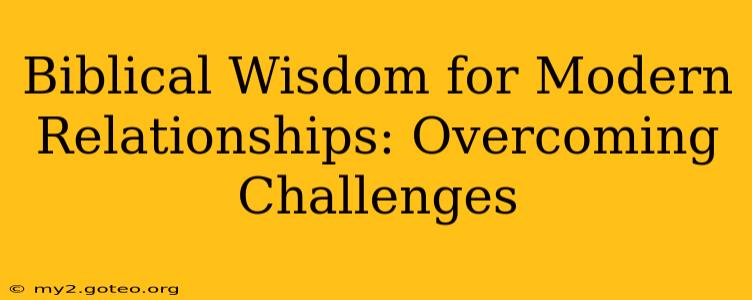Modern relationships face unique challenges in today's fast-paced, technology-driven world. While the intricacies of dating, marriage, and committed partnerships have evolved, the core principles of healthy relationships remain timeless. Drawing wisdom from the Bible can provide a powerful framework for navigating these complexities and building strong, lasting bonds. This isn't about imposing religious dogma, but rather applying enduring principles of love, respect, and commitment to enrich our modern lives.
What are some key biblical principles for strong relationships?
The Bible offers a wealth of guidance on relationships, emphasizing love, commitment, and forgiveness as foundational elements. 1 Corinthians 13 famously describes love as patient, kind, not envious or boastful. It doesn't insist on its own way; it is not irritable or resentful; it does not rejoice at wrongdoing but rejoices with the truth. This passage provides a potent blueprint for navigating conflict and maintaining a healthy dynamic. Other key principles include:
- Communication: Proverbs 15:1 emphasizes the importance of choosing your words carefully ("A gentle answer turns away wrath, but a harsh word stirs up anger"). Open, honest communication, free from judgment and criticism, is crucial.
- Respect: Ephesians 5:33 urges husbands to love their wives and wives to respect their husbands. This mutual respect forms the bedrock of a healthy partnership, fostering trust and understanding.
- Forgiveness: Mark 11:25 highlights the transformative power of forgiveness ("And whenever you stand praying, forgive, if you have anything against anyone, so that your Father also who is in heaven may forgive you your trespasses"). Holding onto resentment damages the relationship; forgiveness allows for healing and growth.
- Commitment: Matthew 19:6 emphasizes the sanctity of marriage, emphasizing that what God has joined together, let no one separate. This commitment transcends fleeting emotions, providing stability and security.
- Selflessness: Philippians 2:3-4 encourages putting others before oneself ("Do nothing from selfish ambition or conceit, but in humility count others more significant than yourselves. Let each of you look not only to his own interests, but also to the interests of others"). This selfless approach fosters a collaborative and supportive environment.
How can biblical wisdom help navigate conflict in relationships?
Conflict is inevitable in any relationship. However, the Bible provides tools for constructive conflict resolution:
- Patience and Understanding: James 1:19 reminds us to "be quick to listen, slow to speak, slow to anger." This approach allows for a calmer, more reasoned response during disagreements.
- Seeking Reconciliation: Matthew 5:23-24 emphasizes the importance of seeking reconciliation promptly ("Therefore, if you are offering your gift at the altar and there remember that your brother has something against you, leave your gift there before the altar and go. First be reconciled to your brother, and then come and offer your gift.").
- Humility and Forgiveness: Proverbs 11:2 states that "pride goes before destruction, and a haughty spirit before a fall." Acknowledging our own flaws and asking for forgiveness are essential steps towards reconciliation.
How does biblical wisdom address the issue of forgiveness in relationships?
Forgiveness is not a one-time act but a continuous process. Biblical wisdom emphasizes the importance of:
- Letting Go of Resentment: Hebrews 12:15 urges us to "make every effort to live in peace with all men and to be holy; without holiness no one will see the Lord." Holding onto resentment only hurts ourselves and the relationship.
- Empathy and Compassion: Putting ourselves in the other person's shoes can help us understand their perspective and extend forgiveness more readily.
- Seeking God's Grace: Recognizing our own imperfections and relying on God's grace for strength and guidance facilitates the process of extending forgiveness.
How can biblical teachings guide couples in effective communication?
Effective communication is the cornerstone of any healthy relationship. Biblical wisdom offers guidance on:
- Active Listening: Focusing intently on what the other person is saying, rather than formulating a response.
- Empathetic Communication: Seeking to understand the other person's feelings and perspective.
- Honest and Open Dialogue: Creating a safe space for open and honest communication without fear of judgment.
- Avoiding Accusations and Blame: Focusing on "I" statements rather than "you" statements to minimize defensiveness.
What role does commitment play in maintaining a strong relationship according to biblical teachings?
Commitment forms the bedrock of a lasting relationship. Biblical teachings emphasize:
- Long-term Perspective: Focusing on the future and working together towards shared goals.
- Unwavering Devotion: Remaining loyal and faithful through both good times and bad.
- Sacrifice and Selflessness: Putting the needs of the relationship before personal desires.
By applying these enduring principles from the Bible, individuals can cultivate healthier, more fulfilling relationships, navigating the challenges of modern life with wisdom, grace, and understanding. The core message emphasizes love, respect, forgiveness, and commitment – values that remain universally relevant regardless of cultural or societal shifts.

